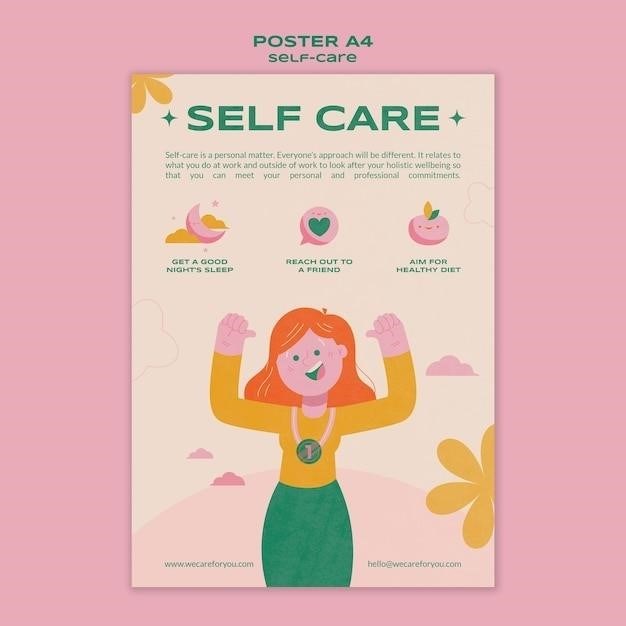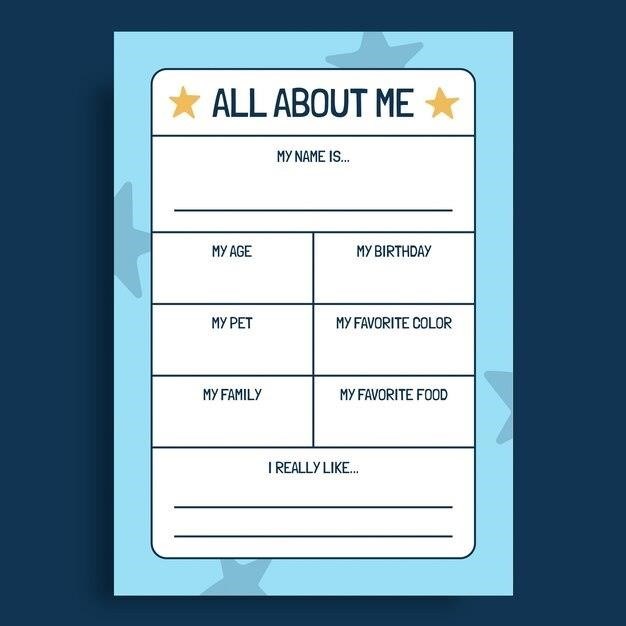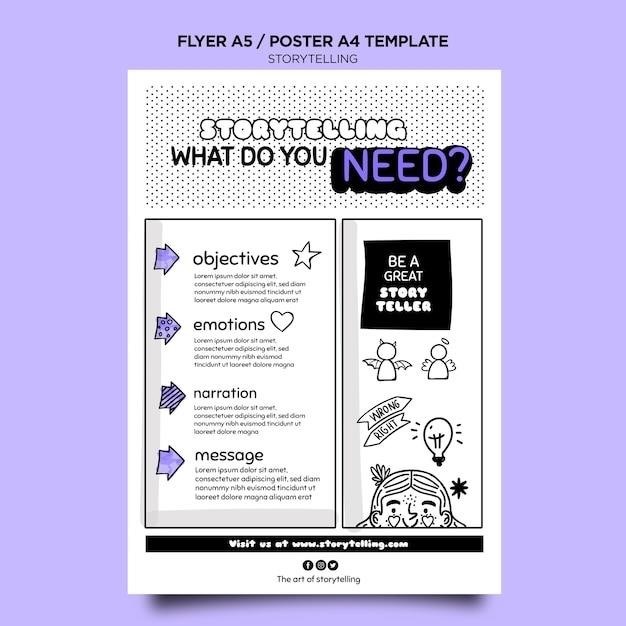
The Importance of Honesty in Recovery
Honesty is paramount in recovery․ Openly confronting past behaviors and feelings, via worksheets or therapy, fosters self-awareness and paves the way for genuine change․ These tools aid in building trust and healing, essential for long-term success․
Defining Honesty in the Recovery Process
In the context of recovery worksheets, honesty transcends simple truth-telling; it represents a profound commitment to self-awareness and accountability․ It involves unflinchingly examining one’s thoughts, feelings, and behaviors, acknowledging both positive and negative aspects without judgment or self-deception․ This necessitates confronting uncomfortable truths about past actions and their consequences, recognizing patterns of behavior that contribute to challenges, and accepting responsibility for one’s role in those patterns․ Honesty in recovery isn’t merely about confessing past mistakes; it’s about fostering a deep understanding of oneself, identifying underlying issues that fuel addictive behaviors, and cultivating a willingness to change․ This process often entails a willingness to be vulnerable, to share difficult experiences, and to accept support from others․ Recovery worksheets can serve as valuable tools in facilitating this honest self-reflection, guiding individuals toward a more complete and accurate understanding of their experiences․
Honesty as a Foundation for Recovery
Honesty forms the bedrock of successful recovery․ Without a commitment to truthful self-assessment, progress is severely hampered․ Recovery worksheets often emphasize this foundational aspect, guiding users through exercises designed to unearth hidden truths and confront denial․ The process encourages individuals to acknowledge the full extent of their struggles, including past mistakes and current challenges․ This self-honesty facilitates a deeper understanding of the root causes of addiction and other issues, paving the way for meaningful change․ By honestly confronting their weaknesses and vulnerabilities, individuals build a stronger foundation for growth and healing․ This commitment to truthfulness extends beyond self-reflection; it also necessitates open communication with therapists, support groups, and loved ones․ Openness and honesty foster trust and create a supportive environment conducive to recovery․ Ultimately, embracing honesty allows for a more accurate assessment of progress, the identification of potential setbacks, and the development of effective coping mechanisms for future challenges․
The Role of Self-Honesty in Recovery Worksheets
Recovery worksheets play a crucial role in fostering self-honesty, a vital component of successful recovery․ These structured tools provide a safe and private space for individuals to explore their thoughts and feelings without judgment․ Through guided prompts and exercises, worksheets encourage introspection and self-reflection, prompting users to confront uncomfortable truths about their past behaviors, thought patterns, and emotional responses․ This process can be challenging, requiring courage and vulnerability, but the benefits are significant․ By honestly documenting their experiences, individuals gain a clearer understanding of their strengths and weaknesses, identifying triggers and patterns that contribute to addictive behaviors or other challenges․ This increased self-awareness is crucial for developing personalized strategies to manage cravings, cope with stress, and make healthier choices․ Worksheets also help individuals track their progress, providing tangible evidence of their growth and resilience․ This reinforcement of positive change boosts self-esteem and reinforces the commitment to sustained recovery․ The structured format of the worksheets provides a framework for honest self-reflection, making the process more manageable and less daunting․

Utilizing Honesty Worksheets for Self-Reflection
Honesty worksheets facilitate deep self-reflection, crucial for recovery․ These guided exercises help uncover hidden patterns and emotions, promoting self-awareness and paving the path toward lasting change and improved well-being․
Worksheet Exercises⁚ Identifying Strengths and Weaknesses
Effective honesty worksheets guide users through a structured process of self-assessment, prompting reflection on both positive and negative aspects of their lives․ These exercises often involve listing personal strengths, such as resilience, empathy, or creativity, alongside weaknesses like procrastination, impulsivity, or poor communication skills․ The goal isn’t simply to identify these traits but to understand their origins and impact․ For instance, a worksheet might ask users to explore how impulsivity has contributed to past problems, encouraging them to consider the root causes and potential coping mechanisms․ By acknowledging both strengths and weaknesses, individuals gain a more balanced and realistic understanding of themselves, which is crucial for personal growth and recovery․ This balanced perspective allows for the development of a personalized recovery plan that builds upon existing strengths while addressing weaknesses constructively․ The process fosters self-compassion and promotes a sense of agency in overcoming challenges․ The focus remains on progress and growth, rather than dwelling on past mistakes․ This approach facilitates a more positive and sustainable path toward recovery․
Confronting Past Hurts and Developing Coping Mechanisms
Many recovery worksheets incorporate exercises designed to help individuals confront past traumas and develop healthier coping mechanisms․ These exercises often involve journaling prompts or guided reflection questions that encourage users to explore past experiences, identify recurring patterns of behavior, and understand the emotional impact of past hurts․ The process isn’t about dwelling on negativity, but about gaining insight into how past experiences have shaped present behaviors and emotional responses․ Through honest self-reflection, individuals can begin to identify unhealthy coping mechanisms, such as substance abuse or self-harm, and replace them with healthier alternatives․ Worksheets might provide strategies for managing stress, regulating emotions, and building healthier relationships․ The focus is on fostering self-compassion and developing resilience, empowering individuals to navigate future challenges in a more constructive manner․ By acknowledging past hurts and developing healthier coping skills, individuals create a foundation for lasting personal growth and recovery․ The worksheets provide a safe and structured environment for this crucial process of self-discovery and healing․
Building Trust and Healing Through Honesty Worksheets
Honesty worksheets play a vital role in fostering trust, both in oneself and in others, which is crucial for successful recovery․ By honestly documenting thoughts and feelings, individuals begin to build a stronger sense of self-awareness and self-acceptance․ This increased self-understanding is foundational to building trust in one’s own ability to navigate challenges and make positive life changes․ Furthermore, the act of honestly sharing personal experiences, even difficult ones, with a therapist or support group, can foster trust in others․ The vulnerability inherent in this process strengthens therapeutic relationships and creates a supportive environment for healing․ These worksheets often include exercises designed to help users identify and address trust issues stemming from past relationships․ The focus is on recognizing patterns of mistrust and developing strategies for building healthier, more trusting relationships going forward․ The process is gradual, but the consistent practice of honesty, aided by the structure and guidance provided by these worksheets, ultimately leads to increased self-trust and the capacity for healthier connections with others․

Resources for Honesty Worksheets and Recovery Support
Numerous online resources offer free printable honesty worksheets in PDF format․ These, coupled with therapy and support groups, provide comprehensive tools for recovery journeys․ Additional resources and support networks further aid personal growth․
Finding Free Honesty Worksheets and PDFs Online
The digital age offers readily accessible resources for those seeking assistance with honesty in recovery․ A quick online search reveals a wealth of free honesty worksheets available as downloadable PDF documents․ These worksheets often guide users through self-reflection exercises designed to promote honesty and self-awareness․ Many websites dedicated to recovery and mental health provide these free resources, making them easily accessible to individuals seeking support․ The ease of access to these tools helps individuals work through their recovery journey at their own pace, providing a valuable supplement to professional therapy or support groups․ These downloadable PDFs offer structured prompts and exercises, helping users delve into their thoughts and feelings related to honesty in a safe and confidential setting․ The anonymity offered by online resources can be particularly beneficial for those who may feel uncomfortable seeking help in person․
Utilizing Worksheets in Therapy and Support Groups
Honesty worksheets serve as powerful tools within the therapeutic setting and support group environments․ Therapists often incorporate these worksheets into sessions to facilitate deeper self-exploration and guide clients toward self-discovery․ The structured format of the worksheets provides a framework for clients to articulate their thoughts and feelings, particularly those related to past experiences and behaviors that may hinder their recovery․ In group therapy, these worksheets can create a safe and shared space for individuals to explore common challenges, fostering a sense of community and mutual support․ The guided exercises within the worksheets can help participants connect with their emotions and honestly assess their strengths and weaknesses, leading to more productive discussions and increased self-awareness․ Support groups can use these worksheets as icebreakers or focused exercises during meetings, providing a structured way to explore themes of honesty and accountability․ The use of worksheets within these settings enhances the overall effectiveness of therapy and support group sessions, fostering a deeper understanding of oneself and promoting healing․
Accessing Additional Recovery Resources and Support
Beyond honesty worksheets, a wealth of resources exists to bolster recovery journeys․ Online platforms offer various materials, including articles, videos, and interactive exercises designed to promote self-reflection and honest self-assessment․ Many websites dedicated to addiction recovery provide free downloadable PDFs of worksheets and guides focusing on honesty and other crucial aspects of the recovery process․ These digital resources often supplement traditional therapy, providing readily accessible tools for self-help and continued progress․ Support groups, both online and in-person, offer a crucial network of individuals sharing similar experiences․ These groups provide a safe space for open communication, accountability, and mutual support․ Professional guidance from therapists, counselors, and recovery coaches remains invaluable, providing personalized strategies and coping mechanisms tailored to individual needs․ Active participation in these resources—worksheets, online communities, and professional support—significantly enhances the chances of long-term recovery success․ Remember that seeking help is a sign of strength, not weakness․
The Impact of Honesty on Relationships in Recovery
Open communication, fostered by honesty, rebuilds trust in relationships damaged by addiction․ Honest self-reflection helps individuals mend broken bonds and foster healthier connections․ This transparency is vital for lasting recovery and personal growth․
Honesty in Communication with Others
Effective communication is a cornerstone of successful recovery, and honesty plays a crucial role in this process․ When individuals in recovery are honest with others about their struggles, their progress, and any setbacks they may encounter, they create a supportive environment conducive to healing․ This transparency allows for accountability and fosters trust among family members, friends, and support groups․ Open communication helps prevent misunderstandings and fosters a sense of shared responsibility in the recovery journey․ By being truthful about their feelings and experiences, individuals in recovery can build stronger, healthier relationships with those around them․ This honesty allows for genuine connection, empathy, and understanding, which are all crucial components of a sustainable recovery․ Furthermore, honest communication encourages a sense of community and mutual support, helping individuals feel less isolated and more connected to others who understand their challenges․ The willingness to be honest with others is a powerful demonstration of self-awareness and commitment to the recovery process․ It shows that the individual is taking responsibility for their actions and is striving for personal growth․ This openness helps build stronger, more supportive relationships, which are essential for maintaining long-term sobriety and overall well-being․
Maintaining Honesty During the Recovery Journey
Sustaining honesty throughout the recovery process is crucial for long-term success․ It’s a continuous commitment, requiring consistent self-reflection and a willingness to confront uncomfortable truths․ Relapse prevention often hinges on maintaining open communication with support systems, therapists, and sponsors․ Honest self-assessment, perhaps facilitated by journaling or recovery worksheets, helps identify potential triggers and vulnerabilities․ This proactive approach allows for early intervention and prevents minor missteps from escalating into full-blown setbacks․ The recovery journey is not linear; setbacks are inevitable․ Honesty during these times is vital; admitting mistakes promptly and seeking support prevents the cycle of denial and self-deception that can lead to relapse․ Regular check-ins with accountability partners and honest self-evaluation through worksheets can provide valuable insight and prevent a return to old habits․ This ongoing commitment to honesty strengthens the foundation of recovery, fostering self-trust and reinforcing the commitment to a healthier lifestyle․ The dedication to honesty builds resilience and allows for continuous growth and personal development, fostering a more meaningful and sustainable recovery․